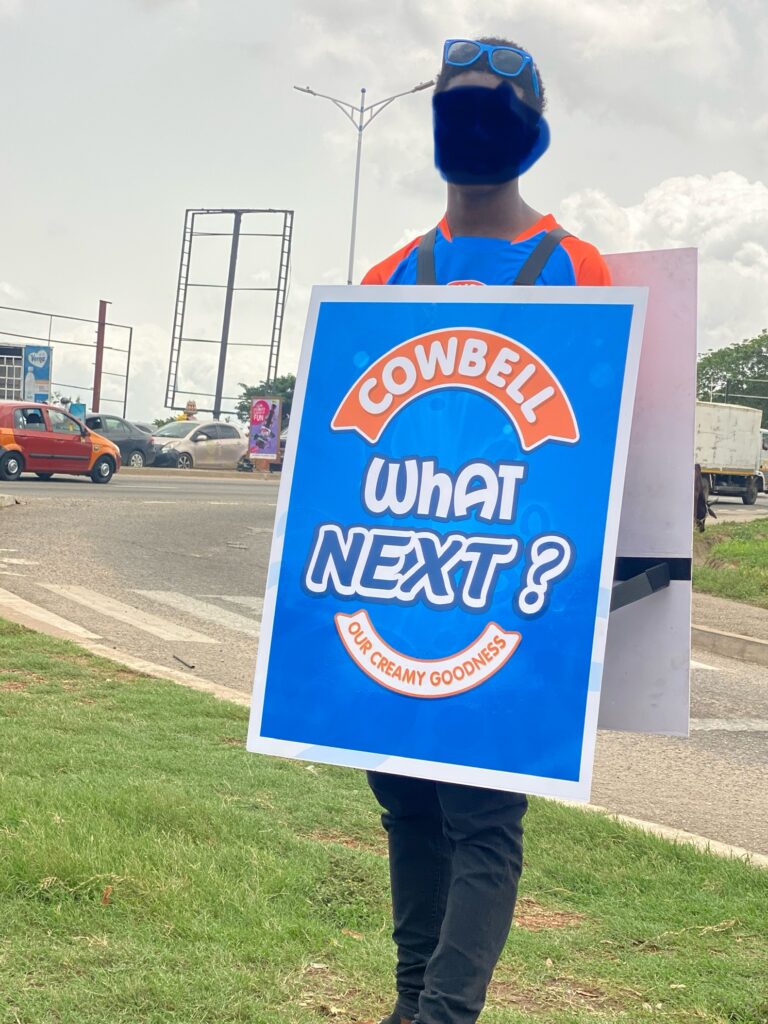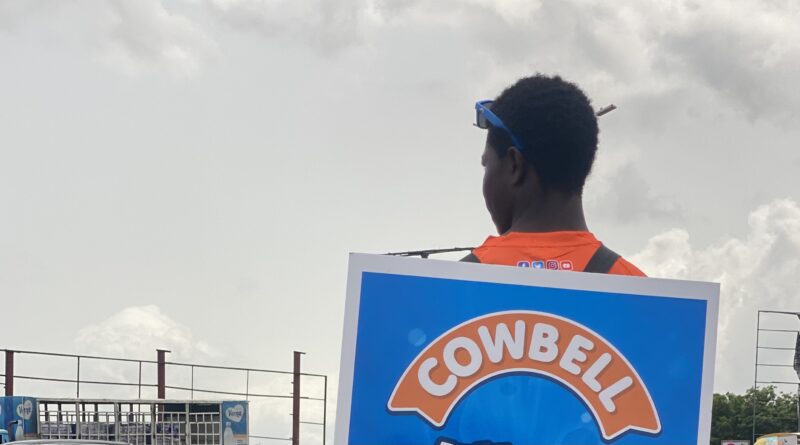Cowbell’s Exploitative Advertising Strategy…Posing Significant Risks to Young Individuals

Under the sweltering sun, a group of young men stood resolutely at the Kawukudi traffic light, the N1 highway, and along the bustling Madina-Accra road as well as some other pars of the capital. From 7:30 AM to 1:30 PM, these individuals endured the heat, all for a mere two hundred Ghana cedis (GHC 200) for six hours of advertising Promasidor (Ghana) Limited’s Cowbell brand. The temperature during this time fluctuated between a mild 25°C in the morning to a sweltering 32°C by midday, before returning to a cooler 25°C as evening approached.
Dressed in promotional gear emblazoned with Cowbel branding, these young men stood out against the backdrop of the busy roadway, drawing the attention of passersby. Their commitment to the job raises significant concerns about both their health and the ethics of such advertising practices. In conversations with some of the young men, it became clear that the financial compensation does not reflect the physical toll of their work. “We stand in the sun for six hours, and we only get GHC 200,” one young man lamented, highlighting the disparity between the risks they face and their meager earnings.
Promasidor, leading provider of high-quality food products across various regions in Africa. Producers of milk powders, culinary, beverages and cereal products.
Medical professionals have long warned against prolonged exposure to the sun, particularly during peak hours, which typically span from 10 AM to 4 PM. The dangers of standing in the intense afternoon heat are manifold, as the human body struggles to regulate its temperature effectively. According to health experts, the consequences of such exposure can lead to serious health issues, including:
1. Heat-Related Illnesses:
• Heat Exhaustion: Characterized by heavy sweating, headaches, dizziness, and nausea, this condition can escalate to heatstroke if not addressed.
• Heatstroke: A critical medical emergency, heatstroke occurs when the body’s temperature exceeds 104°F (40°C), leading to confusion and potential organ failure.
2. Dehydration:
• Excessive sweating can result in significant fluid loss, causing weakness, lightheadedness, and even fainting, particularly when standing for extended periods.
3. Sunburn:
• Prolonged sun exposure can lead to painful sunburns, with symptoms such as redness, swelling, and blisters, as well as long-term skin damage and an increased risk of skin cancer.
4. Blood Vessel Damage:
• Heat can cause blood vessels to dilate, potentially leading to drops in blood pressure, dizziness, or fainting, while also weakening blood vessel walls, increasing the risk of visible broken capillaries.
5. Other Potential Issues:
• Fatigue: The energy expended to regulate body temperature can lead to significant fatigue.
• Increased Risk of Injuries: Dehydration and fatigue may impair coordination and reaction times, raising the likelihood of accidents.
• Sun Sensitivity and Allergies: Some individuals may experience heightened sensitivity to sunlight, leading to rashes and other skin issues.To mitigate these risks, health experts recommend several preventive measures:
• Stay Hydrated: Regularly drink water throughout the day.
• Seek Shade: Remain in shaded areas during peak sun hours.
• Wear Protective Clothing: Opt for light-colored, loose-fitting attire and hats.
• Apply Sunscreen: Utilize sunscreen with an SPF of 30 or higher and reapply frequently.Despite the apparent financial incentive, many argue that Promasidor’s advertising strategy is not only exploitative but also poses significant health risks to these young individuals. Critics assert that such practices dehumanize workers, reducing them to mere advertising tools while jeopardizing their well-being.
As the sun beats down on Madina, the question remains: is the price of advertising worth the potential cost to health and dignity? The young men at the traffic lights may have a financial incentive, but the long-term implications of their exposure to the elements could far outweigh their earnings. As discussions surrounding ethical advertising continue, it is essential for companies like Promasidor to reevaluate their strategies and prioritize the health and safety of their workers.
Metro Lens Newspaper reached out to Abiodun Ayodeji, Head of Marketing at Promasidor Ghana Ltd, regarding concerns over the health risks faced by young promoters in their advertising campaign.
Despite requesting a WhatsApp conversation, Ayodeji failed to respond to messages sent in both English and French.
Instead, a staff member from the communications department contacted us, claiming some promoters received cups. The staff member, who requested anonymity, later asked for evidence of our report.
Promasidor Ghana Ltd’s disregard for our concerns about the welfare of young promoters used in their campaign under harsh weather conditions raises questions about their commitment to their well-being. With reports of promoters being paid GHC 200 without adequate protection, the company’s advertising strategy has significant ethical implications.
We urge the management of Promasidor Ghana Ltd to prioritize the welfare and safety of their promoters. The company must take concrete measures to protect its young ambassadors and ensure their well-being is not compromised for the sake of marketing.

